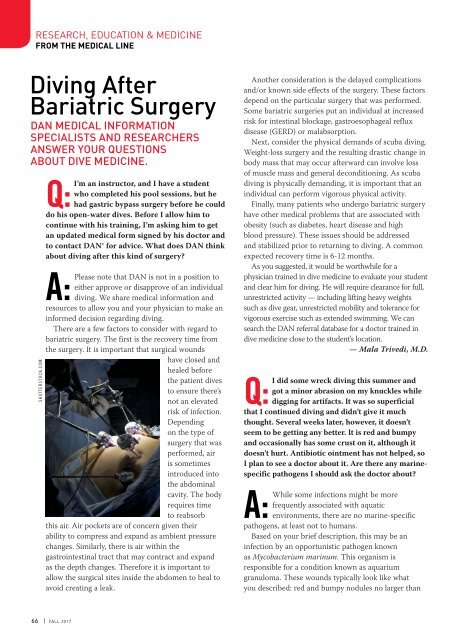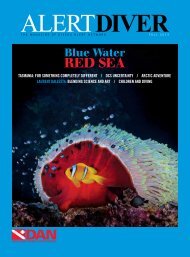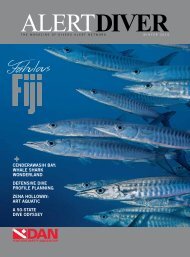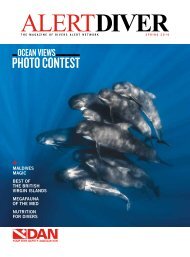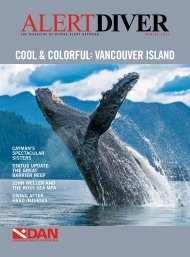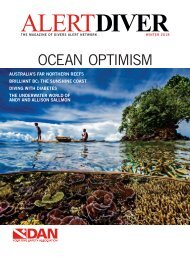AD 2017 Q4
Alert Diver is the dive industry’s leading publication. Featuring DAN’s core content of dive safety, research, education and medical information, each issue is a must-read reference, archived and shared by passionate scuba enthusiasts. In addition, Alert Diver showcases fascinating dive destinations and marine environmental topics through images from the world’s greatest underwater photographers and stories from the most experienced and eloquent dive journalists in the business.
Alert Diver is the dive industry’s leading publication. Featuring DAN’s core content of dive safety, research, education and medical information, each issue is a must-read reference, archived and shared by passionate scuba enthusiasts. In addition, Alert Diver showcases fascinating dive destinations and marine environmental topics through images from the world’s greatest underwater photographers and stories from the most experienced and eloquent dive journalists in the business.
Create successful ePaper yourself
Turn your PDF publications into a flip-book with our unique Google optimized e-Paper software.
RESEARCH, EDUCATION & MEDICINE<br />
FROM THE MEDICAL LINE<br />
Diving After<br />
Bariatric Surgery<br />
DAN MEDICAL INFORMATION<br />
SPECIALISTS AND RESEARCHERS<br />
ANSWER YOUR QUESTIONS<br />
ABOUT DIVE MEDICINE.<br />
SHUTTERSTOCK.COM<br />
Q:<br />
I’m an instructor, and I have a student<br />
who completed his pool sessions, but he<br />
had gastric bypass surgery before he could<br />
do his open-water dives. Before I allow him to<br />
continue with his training, I’m asking him to get<br />
an updated medical form signed by his doctor and<br />
to contact DAN® for advice. What does DAN think<br />
about diving after this kind of surgery?<br />
A:<br />
Please note that DAN is not in a position to<br />
either approve or disapprove of an individual<br />
diving. We share medical information and<br />
resources to allow you and your physician to make an<br />
informed decision regarding diving.<br />
There are a few factors to consider with regard to<br />
bariatric surgery. The first is the recovery time from<br />
the surgery. It is important that surgical wounds<br />
have closed and<br />
healed before<br />
the patient dives<br />
to ensure there’s<br />
not an elevated<br />
risk of infection.<br />
Depending<br />
on the type of<br />
surgery that was<br />
performed, air<br />
is sometimes<br />
introduced into<br />
the abdominal<br />
cavity. The body<br />
requires time<br />
to reabsorb<br />
this air. Air pockets are of concern given their<br />
ability to compress and expand as ambient pressure<br />
changes. Similarly, there is air within the<br />
gastrointestinal tract that may contract and expand<br />
as the depth changes. Therefore it is important to<br />
allow the surgical sites inside the abdomen to heal to<br />
avoid creating a leak.<br />
Another consideration is the delayed complications<br />
and/or known side effects of the surgery. These factors<br />
depend on the particular surgery that was performed.<br />
Some bariatric surgeries put an individual at increased<br />
risk for intestinal blockage, gastroesophageal reflux<br />
disease (GERD) or malabsorption.<br />
Next, consider the physical demands of scuba diving.<br />
Weight-loss surgery and the resulting drastic change in<br />
body mass that may occur afterward can involve loss<br />
of muscle mass and general deconditioning. As scuba<br />
diving is physically demanding, it is important that an<br />
individual can perform vigorous physical activity.<br />
Finally, many patients who undergo bariatric surgery<br />
have other medical problems that are associated with<br />
obesity (such as diabetes, heart disease and high<br />
blood pressure). These issues should be addressed<br />
and stabilized prior to returning to diving. A common<br />
expected recovery time is 6-12 months.<br />
As you suggested, it would be worthwhile for a<br />
physician trained in dive medicine to evaluate your student<br />
and clear him for diving. He will require clearance for full,<br />
unrestricted activity — including lifting heavy weights<br />
such as dive gear, unrestricted mobility and tolerance for<br />
vigorous exercise such as extended swimming. We can<br />
search the DAN referral database for a doctor trained in<br />
dive medicine close to the student’s location.<br />
— Mala Trivedi, M.D.<br />
Q:<br />
I did some wreck diving this summer and<br />
got a minor abrasion on my knuckles while<br />
digging for artifacts. It was so superficial<br />
that I continued diving and didn’t give it much<br />
thought. Several weeks later, however, it doesn’t<br />
seem to be getting any better. It is red and bumpy<br />
and occasionally has some crust on it, although it<br />
doesn’t hurt. Antibiotic ointment has not helped, so<br />
I plan to see a doctor about it. Are there any marinespecific<br />
pathogens I should ask the doctor about?<br />
A:<br />
While some infections might be more<br />
frequently associated with aquatic<br />
environments, there are no marine-specific<br />
pathogens, at least not to humans.<br />
Based on your brief description, this may be an<br />
infection by an opportunistic pathogen known<br />
as Mycobacterium marinum. This organism is<br />
responsible for a condition known as aquarium<br />
granuloma. These wounds typically look like what<br />
you described: red and bumpy nodules no larger than<br />
66 | FALL <strong>2017</strong>


